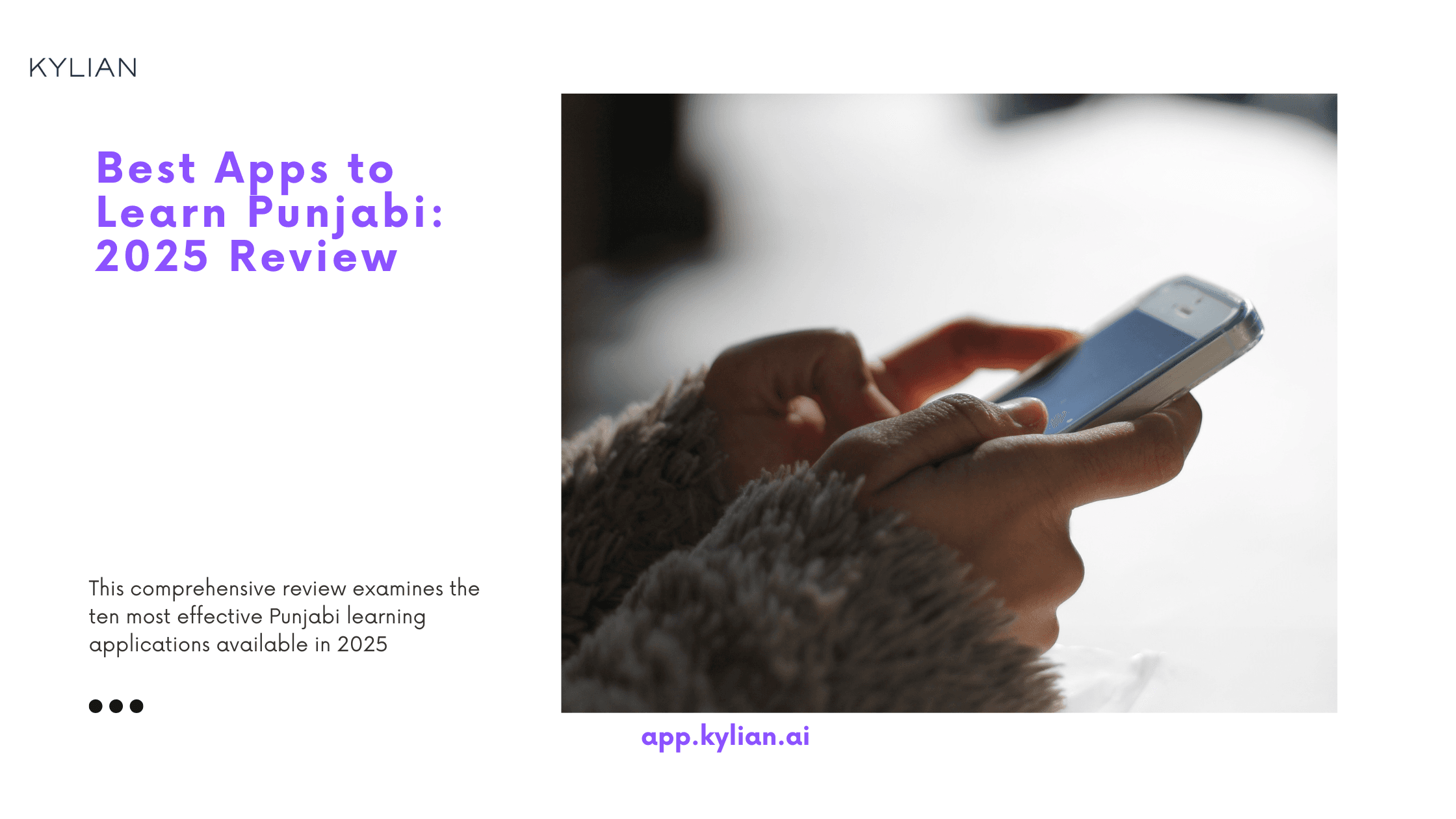

Best Apps to Learn Punjabi: 2025 Review
Learning Punjabi has shifted from traditional classroom settings to sophisticated mobile applications that deliver authentic language immersion. With over 100 million native speakers worldwide and growing demand for multilingual professionals, mastering Punjabi opens doors to business opportunities across India, Pakistan, and diaspora communities globally. The challenge lies in choosing the right learning platform. Most language apps treat Punjabi as an afterthought, offering limited content that barely scratches the surface of this complex tonal language. The Gurmukhi script, unique phonetics, and cultural nuances require specialized attention that generic language platforms simply cannot provide. We evaluated dozens of Punjabi learning applications based on content depth, pedagogical approach, pronunciation accuracy, cultural integration, and user outcomes. Our analysis reveals significant disparities in quality, with many apps offering superficial vocabulary lists while others provide comprehensive language acquisition frameworks. This comprehensive review examines the ten most effective Punjabi learning applications available in 2025, analyzing their strengths, limitations, and optimal use cases to help you make an informed decision about your language learning journey.
![Mastering Yoga Terms: All the Vocabulary You Need [English]](/_next/image?url=https%3A%2F%2Fcdn.sanity.io%2Fimages%2F147z5m2d%2Fproduction%2F74e5429ba955d0b85b0bc6b5ef1c628f5fed8f2f-2240x1260.png&w=3840&q=75)

Mastering Yoga Terms: All the Vocabulary You Need [English]
Understanding yoga vocabulary transforms your practice from a series of physical movements into a meaningful journey of self-discovery. When you grasp the terminology behind each pose, breathing technique, and philosophical concept, you unlock deeper layers of this 5,000-year-old discipline that extends far beyond physical flexibility. The difference between practicing yoga with and without vocabulary knowledge parallels the difference between reading music notation versus playing by ear. Both approaches work, but understanding the language amplifies your ability to connect with instructors, follow advanced sequences, and appreciate the cultural richness embedded in every Sanskrit term. Whether you're stepping onto the mat for the first time or seeking to deepen your existing practice, mastering yoga vocabulary enhances your ability to receive precise instruction, understand modifications, and engage with the spiritual dimensions that make yoga a transformative practice rather than mere exercise.


8 Best English Conversation Courses for Fluent Speaking
Learning conversational English extends far beyond textbook grammar and vocabulary memorization. The ability to engage in natural, flowing conversations represents the ultimate test of language proficiency—and the gateway to genuine communication in professional, academic, and social contexts. The statistics tell a compelling story about why conversation skills matter more than ever. According to the Cambridge English Language Assessment, 87% of English learners report that speaking remains their most challenging skill to develop. Meanwhile, research from the British Council indicates that conversational competence directly correlates with career advancement opportunities, with professionals who demonstrate strong English speaking skills earning 25% more on average than their less fluent counterparts. This reality creates a fundamental challenge: traditional language learning approaches often emphasize reading and writing while neglecting the dynamic, real-time nature of spoken interaction. The result? Learners who can parse complex texts but struggle to order coffee or participate in workplace discussions. The solution lies in specialized English conversation courses designed specifically to bridge this gap. These programs prioritize speaking practice, real-world scenarios, and the development of conversational confidence that transforms academic knowledge into practical communication ability.


Why Learn Dothraki: The Case for Constructed Languages
The question isn't whether constructed languages are "real" enough to warrant your time—it's whether you're missing critical linguistic advantages by dismissing them. When linguist David J. Peterson crafted Dothraki for HBO's Game of Thrones, he didn't just create fictional vocabulary. He engineered a complete linguistic system that mirrors the complexity of natural languages, complete with grammatical structures that can accelerate your mastery of conventional languages. This matters now because language learning has fundamentally shifted. Traditional approaches focus on economic necessity or academic requirements, but the most effective language acquisition happens when learners are genuinely engaged with the material. The rise of constructed languages represents a paradigm shift toward passion-driven learning that produces measurably better results.


Italian Greetings: 30 Essential Forms and Usage Guide
Mastering Italian greetings represents far more than memorizing vocabulary—it unlocks authentic cultural connection. Every greeting carries social weight, timing precision, and relationship dynamics that determine whether you're perceived as culturally aware or merely another tourist stumbling through basic phrases. Italian communication operates on nuanced social hierarchies where the wrong greeting can signal disrespect, while the right one opens doors to genuine relationships. This distinction matters because Italians evaluate your cultural competence within the first exchange, making greeting mastery essential for meaningful interactions. Understanding when to deploy "ciao" versus "buongiorno" or recognizing the temporal boundaries of "buonasera" demonstrates respect for Italian social customs that locals notice immediately. This guide examines 30 essential Italian greetings, their contextual applications, and the cultural intelligence behind each choice.
![Hanja vs. Hangul: What's the Difference? [Korean]](/_next/image?url=https%3A%2F%2Fcdn.sanity.io%2Fimages%2F147z5m2d%2Fproduction%2F3b6653e03699a5084ab7bef33e405c927439fed8-2240x1260.png&w=3840&q=75)

Hanja vs. Hangul: What's the Difference? [Korean]
The Korean writing system presents a fascinating linguistic paradox that most language learners encounter but few truly understand. While modern Korean relies primarily on Hangul, the elegant phonetic alphabet created in the 15th century, the shadow of Hanja—Chinese characters—still permeates the language in ways that fundamentally shape how Korean functions today. This distinction matters more than most realize. Understanding the relationship between Hanja and Hangul isn't just academic curiosity—it's the key to unlocking why Korean vocabulary works the way it does, why certain words sound identical but mean completely different things, and why advanced Korean proficiency often hits a ceiling without this knowledge. The question isn't whether you need both systems to speak Korean. The question is whether you want to truly comprehend the language's architecture or remain perpetually confused by its deeper patterns.


11 Best Arabic Learning Apps in 2025
Arabic stands as one of the world's most influential languages, spoken by over 400 million people across 26 countries. Yet mastering this Semitic language presents unique challenges that standard language learning approaches often fail to address effectively. The Arabic script flows right to left, letters transform based on their position within words, and dialectal variations can dramatically alter meaning across regions. Modern Arabic learning apps have evolved to tackle these complexities head-on, offering specialized tools that traditional classroom settings cannot match. The question becomes: which platforms actually deliver measurable results versus those that merely gamify the learning process without substantial linguistic progress? This analysis examines eleven applications that demonstrate proven effectiveness in Arabic language acquisition, evaluated through user outcomes, linguistic methodology, and practical application. Each platform serves distinct learning objectives, from alphabet mastery to conversational fluency, making strategic selection crucial for achieving specific goals. Self-study applications provide essential foundation-building capabilities, yet research consistently demonstrates that combining these tools with live instruction accelerates proficiency development. The most successful Arabic learners integrate multiple learning modalities rather than relying on single-platform approaches.
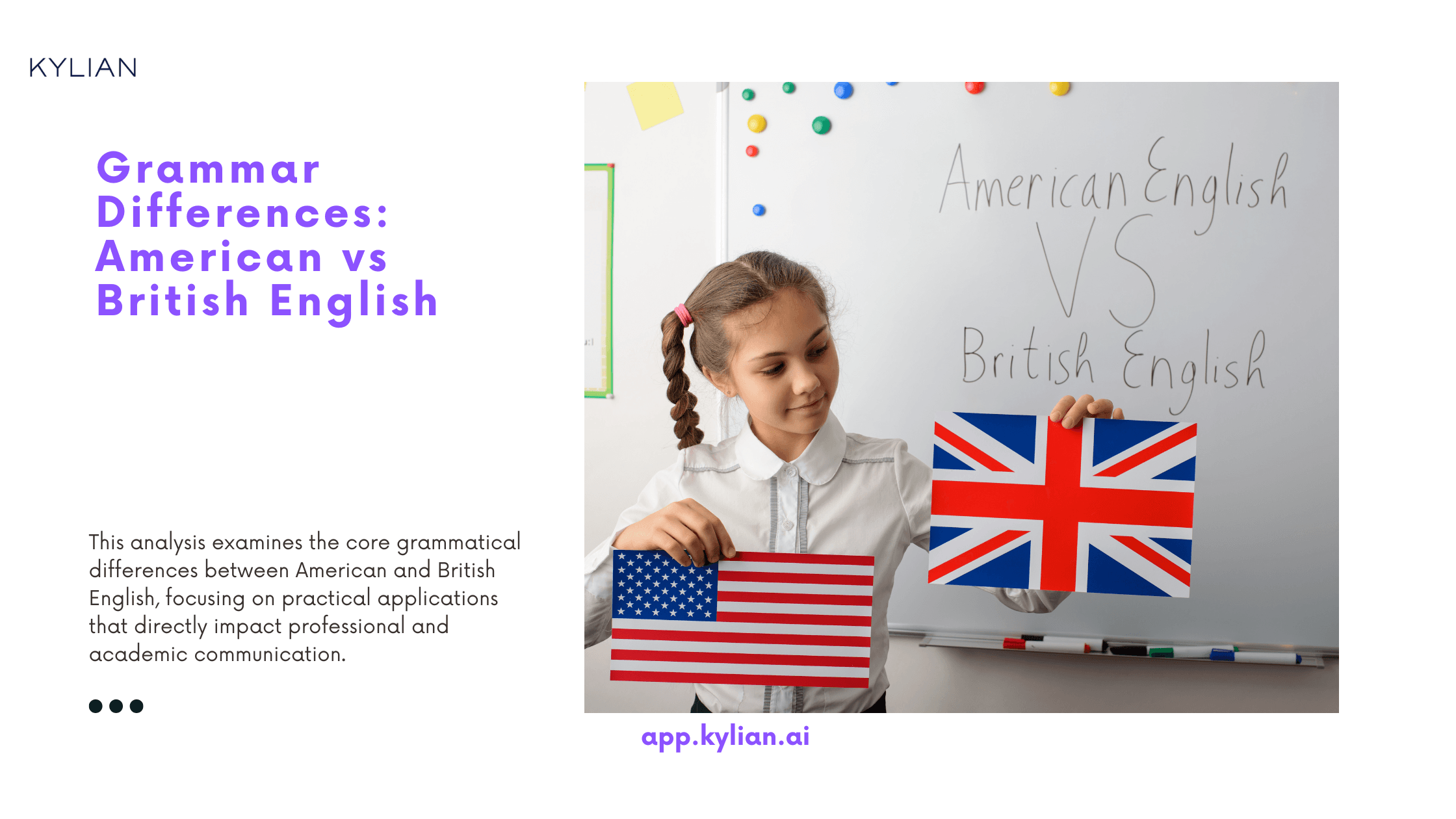

Grammar Differences: American vs British English
English speakers worldwide navigate subtle yet significant grammatical variations that can determine professional credibility and communication effectiveness. Understanding these distinctions matters more than most realize—particularly for professionals working across international markets, students preparing for standardized tests, or writers targeting specific audiences. The stakes are higher than simple preference. Grammar choices signal geographical origin, educational background, and cultural alignment. They influence how your message lands with different audiences and can determine whether your content resonates or feels foreign to your intended readers. Why does this matter now? Global remote work has eliminated geographical barriers, making cross-cultural communication skills essential rather than optional. A misplaced verb tense or incorrect collective noun usage can undermine your credibility in international business settings or academic environments. This analysis examines the core grammatical differences between American and British English, focusing on practical applications that directly impact professional and academic communication. Each difference represents a decision point that affects how your audience perceives your expertise and cultural awareness.
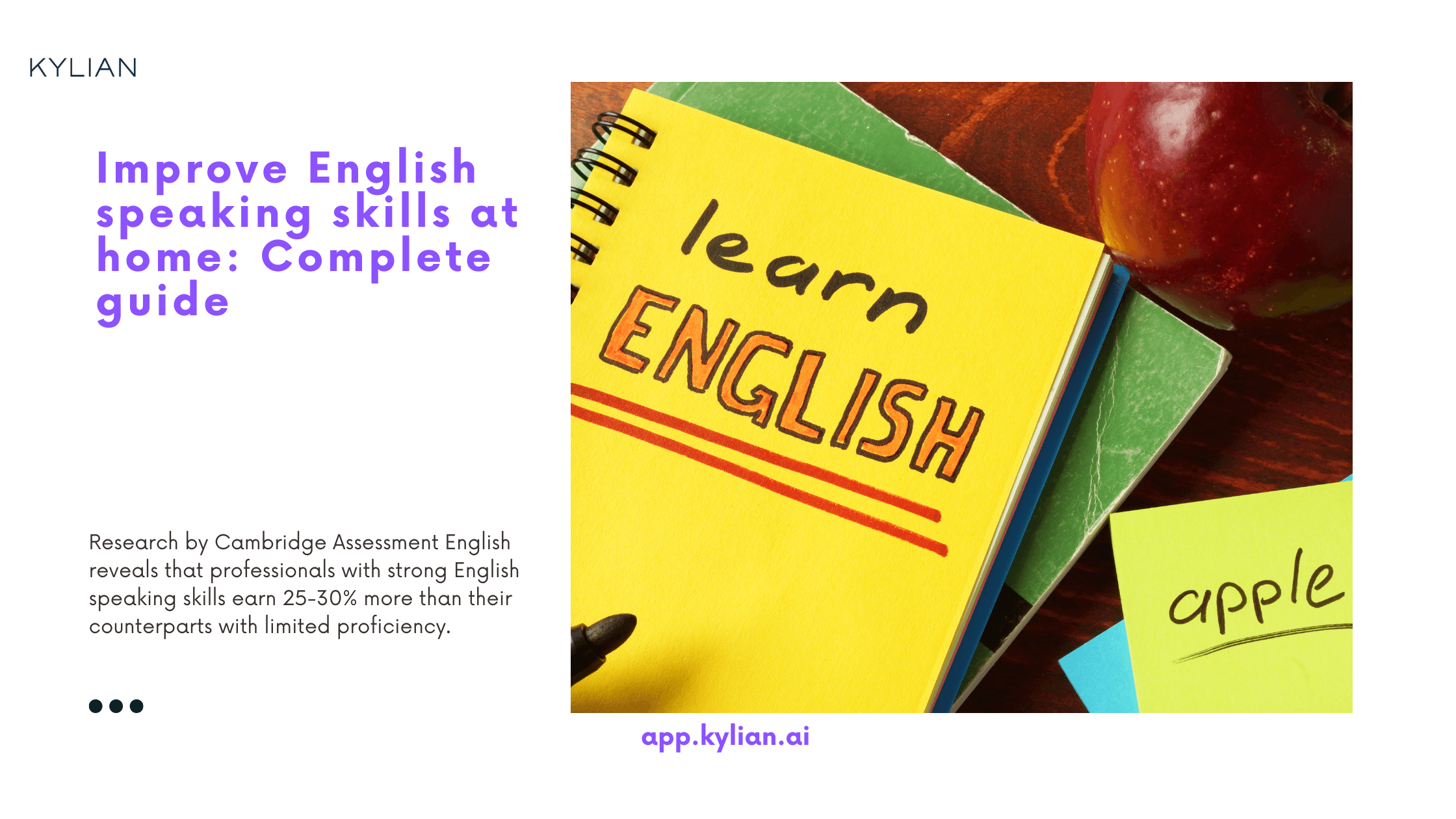

Improve English speaking skills at home: Complete guide
The economics of English fluency are undeniable. Research by Cambridge Assessment English reveals that professionals with strong English speaking skills earn 25-30% more than their counterparts with limited proficiency. Yet most language learners invest hundreds of hours memorizing grammar rules and vocabulary while neglecting the one skill that determines their professional trajectory: speaking. This disparity stems from a fundamental misunderstanding of how language acquisition works. Your brain doesn't learn to speak through textbook exercises—it learns through repeated exposure to real conversations, feedback loops, and deliberate practice. The challenge is that traditional classroom settings provide minimal speaking opportunities, often limiting students to a few minutes of actual conversation per hour. Home-based learning environments eliminate these constraints entirely. You control the frequency, intensity, and focus of your practice sessions. More importantly, you can implement evidence-based methodologies that accelerate speaking development without the artificial limitations of structured curricula.


Most Savage Email Greetings That Kill Relationships
Email communication has evolved into a complex battlefield where every greeting and sign-off carries weight. Recent research analyzing American workplace communication patterns reveals that 91% of employees encounter passive-aggressive behavior through email exchanges, with nearly half (46%) claiming they can decode a colleague's mood simply by examining how they open and close their messages. The data exposes a harsh reality: your email etiquette choices can inadvertently brand you as savage, uptight, or dismissive. More concerning is that 37% of workers deliberately manipulate their usual salutations to express frustration, with Generation Z leading this trend of emotional expression through digital formality.


Play the Spanish Accents Quiz: Master Recognition Skills
Spanish accent recognition represents a critical milestone in language mastery that extends far beyond academic achievement. With over 450 million native speakers across 21 countries, the ability to distinguish regional variations directly impacts professional opportunities, cultural understanding, and communication effectiveness in an increasingly interconnected global economy. Recent comprehensive data from over 51,000 participants across 101 countries reveals striking patterns in accent recognition difficulty, providing actionable insights for Spanish learners seeking to advance from intermediate to fluent proficiency levels.
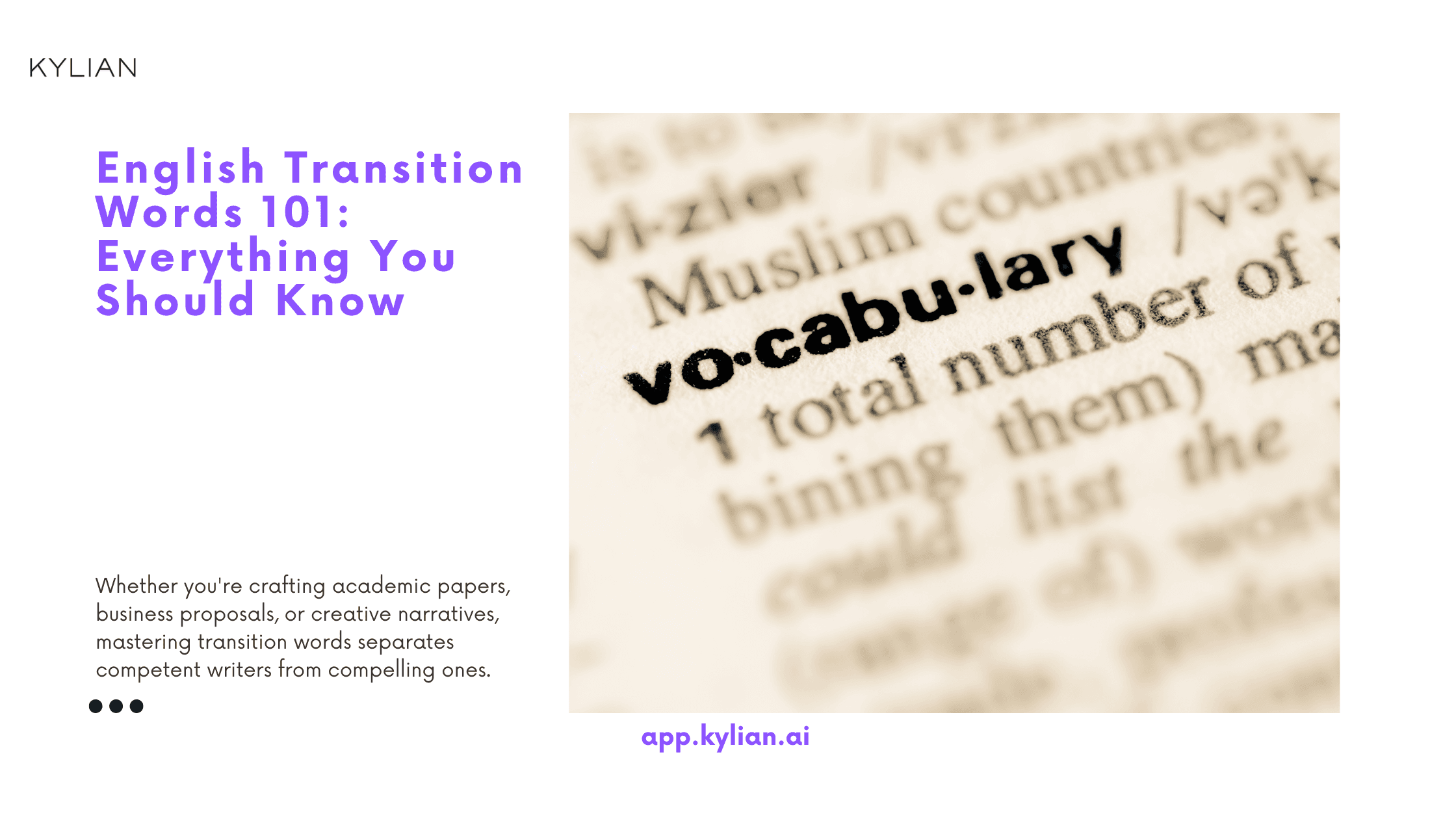

English Transition Words 101: Everything You Should Know
Why do some pieces of writing flow effortlessly while others feel choppy and disjointed? The answer lies in the strategic use of transition words—linguistic bridges that transform fragmented thoughts into coherent communication. These seemingly simple connectors determine whether your reader follows your logic or abandons your content midway through. The ability to guide readers through complex ideas isn't just about good writing; it's about effective communication that drives results. Whether you're crafting academic papers, business proposals, or creative narratives, mastering transition words separates competent writers from compelling ones.


Best Netflix Shows for Learning English: Expert Analysis
Language acquisition through entertainment media has transformed from casual consumption to strategic learning methodology. Netflix's global reach and diverse content catalog presents an unprecedented opportunity for English language learners to immerse themselves in authentic linguistic environments while engaging with compelling narratives. The effectiveness of television-based language learning stems from its multisensory approach. Unlike traditional textbook methods, streaming content delivers contextual vocabulary, cultural nuances, and pronunciation patterns simultaneously. This convergence creates optimal conditions for natural language absorption—the same process native speakers experience during childhood development.


How to say hello in Dutch: A beginner's guide
Mastering Dutch greetings isn't just about memorizing words—it's about understanding the cultural framework that determines when, how, and why Dutch speakers choose specific expressions. The Netherlands has a greeting system that reflects their directness, practicality, and social hierarchy awareness. This matters because using the wrong greeting can immediately signal your outsider status, while the right choice opens doors to authentic connections. Dutch greeting patterns follow three critical dimensions: formality levels, time specificity, and relationship context. Understanding these dimensions transforms you from someone who merely knows Dutch words into someone who communicates with cultural intelligence. This guide dissects each element systematically, providing the strategic knowledge needed to navigate Dutch social interactions effectively.
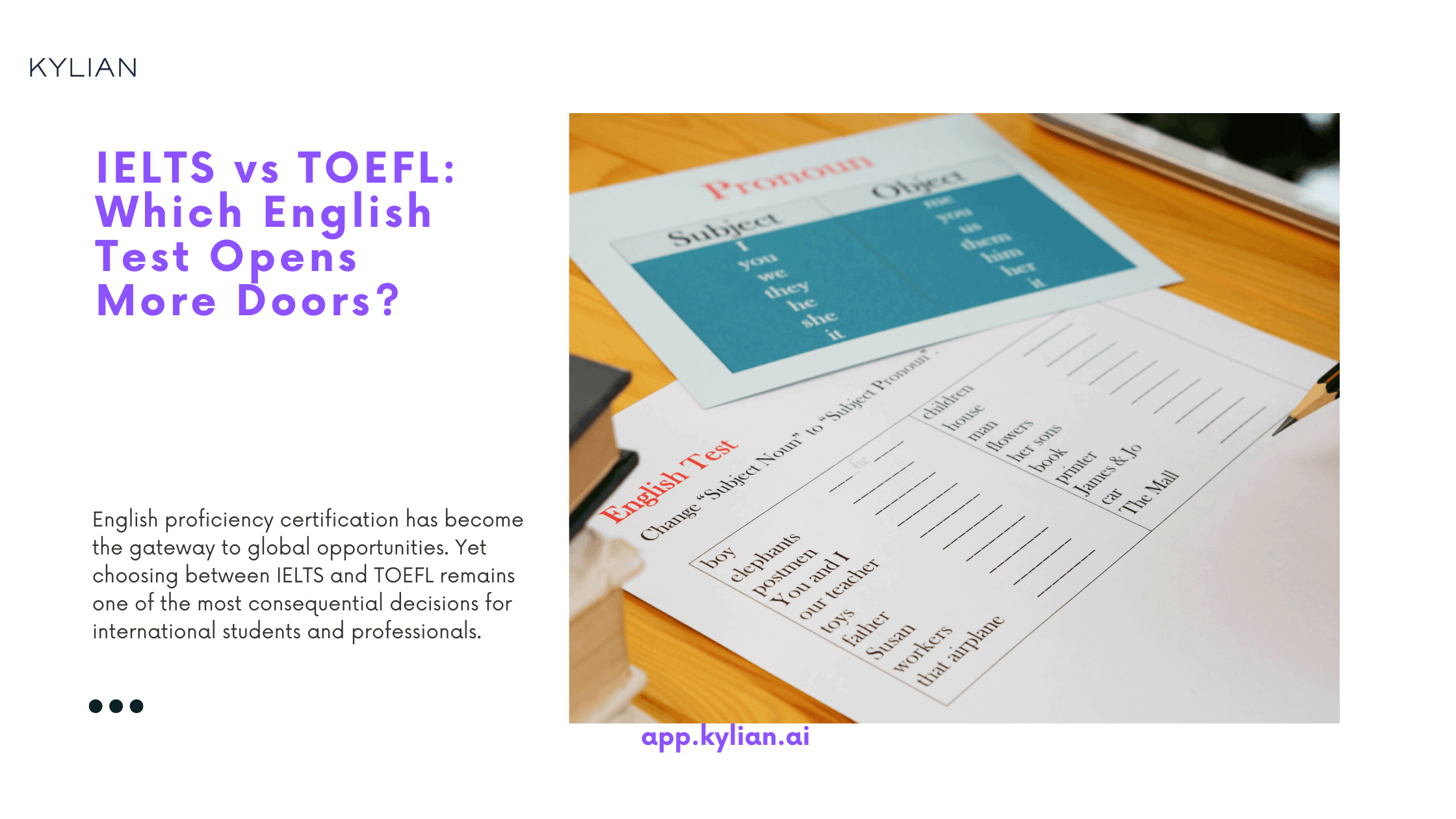

IELTS vs TOEFL: Which English Test Opens More Doors?
English proficiency certification has become the gateway to global opportunities. Yet choosing between IELTS and TOEFL remains one of the most consequential decisions for international students and professionals. This choice directly impacts your academic trajectory, career prospects, and immigration possibilities. The stakes are higher than most realize. A suboptimal test choice can mean the difference between acceptance and rejection, between seamless visa processing and bureaucratic delays. Understanding these two dominant certification systems isn't just helpful—it's essential for anyone serious about leveraging English proficiency for life advancement.
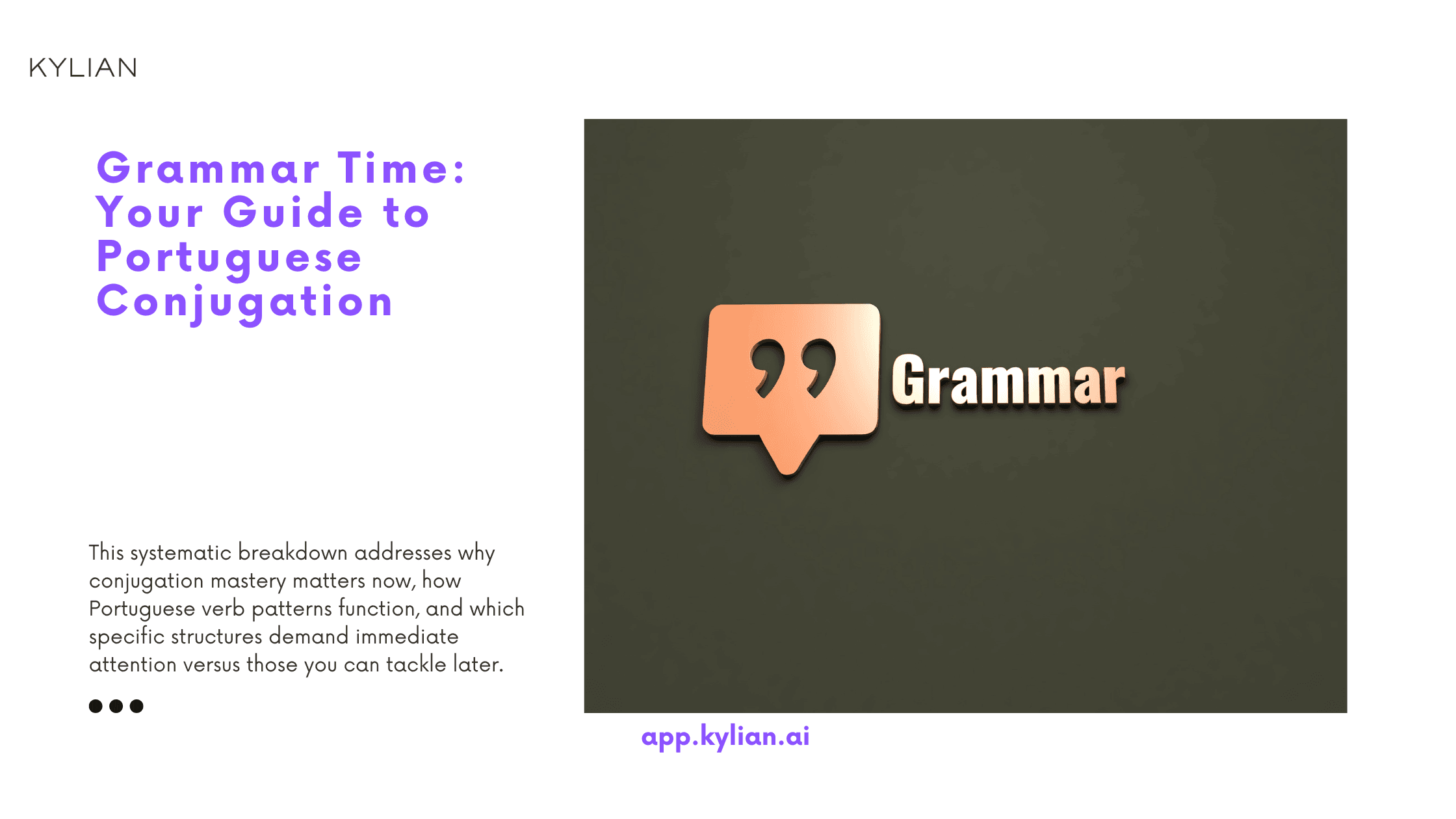

Grammar Time: Your Guide to Portuguese Conjugation
Portuguese conjugation represents one of the most critical barriers between basic vocabulary recognition and authentic communication. While memorizing individual words creates an illusion of progress, understanding how verbs transform based on context determines whether you sound like a confident speaker or someone struggling with disconnected fragments. This systematic breakdown addresses why conjugation mastery matters now, how Portuguese verb patterns function, and which specific structures demand immediate attention versus those you can tackle later.
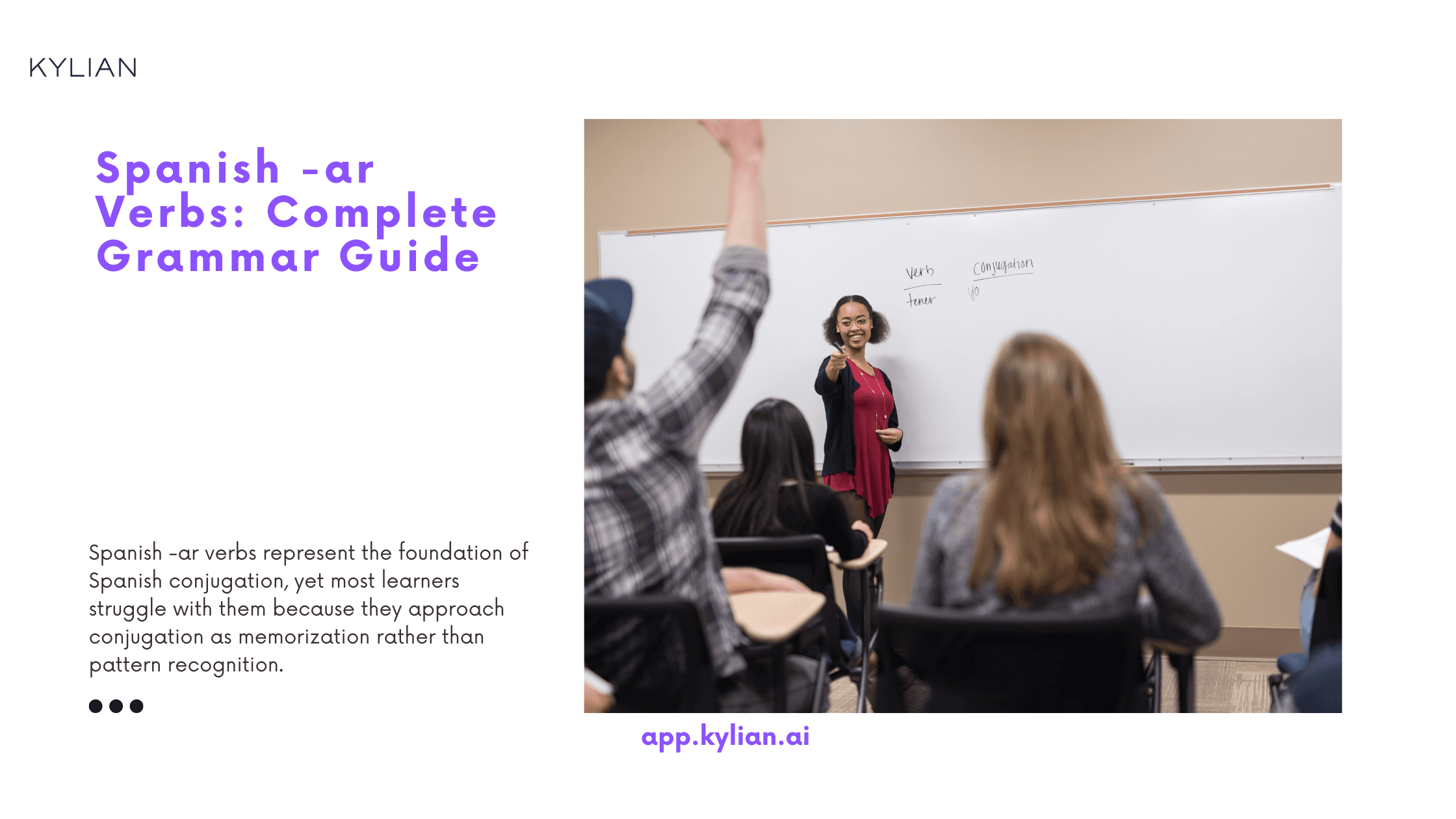

Spanish -ar Verbs: Complete Grammar Guide
Spanish -ar verbs represent the foundation of Spanish conjugation, yet most learners struggle with them because they approach conjugation as memorization rather than pattern recognition. This systematic breakdown will transform how you understand and use these essential verbs.


Furniture Names & Household Items Vocabulary in English
Vocabulary acquisition remains the single most critical barrier preventing English learners from achieving fluency in everyday conversations. While grammar rules provide structure, it's the specific terminology for common objects—furniture and household items—that enables genuine communication about daily life experiences. The challenge extends beyond simple memorization. Research consistently demonstrates that context-rich vocabulary learning produces 300% better retention rates compared to isolated word lists. This reality demands a strategic approach to mastering furniture names and household items vocabulary that connects terminology to practical usage scenarios.


200+ Business Presentation Phrases in English + Tips
Business presentations fail not because of poor content, but because of poor delivery. After analyzing hundreds of failed pitches and successful boardroom presentations, one pattern emerges consistently: the difference lies in how ideas are communicated, not what ideas are communicated. The reality is stark. Research from Harvard Business Review shows that 67% of senior executives report that presentations directly influence their decision-making process. Yet most professionals approach presentations with the same casual language they use in everyday conversations, missing critical opportunities to drive action and influence outcomes. This comprehensive guide provides 200+ battle-tested phrases that transform ordinary presentations into compelling business communications. More importantly, it reveals the strategic thinking behind when and why to use each phrase type to maximize your professional impact.


The Basics of Possessive Pronouns in English Grammar
Mastering possessive pronouns transforms scattered, repetitive speech into precise, professional communication. These grammatical tools don't just indicate ownership—they create the linguistic efficiency that separates fluent speakers from those still wrestling with English fundamentals. Consider this reality: every time you say "the car of John" instead of "his car," you're adding unnecessary cognitive load to your listener's processing. This matters because effective communication isn't about showing off vocabulary—it's about transmitting ideas with maximum clarity and minimum friction. Possessive pronouns serve as linguistic shortcuts that eliminate redundancy while maintaining semantic precision. They represent ownership, belonging, and relationships between entities in ways that streamline both written and spoken English. When you replace lengthy possessive constructions with concise pronouns, you're not just following grammar rules—you're demonstrating mastery of English's efficiency mechanisms. The strategic use of possessive pronouns signals linguistic competence to native speakers and creates the flow that makes complex ideas accessible. This isn't about memorizing rules for the sake of rules. It's about understanding why these grammatical structures exist and how they serve the fundamental purpose of clear, efficient communication.


12 Employee Engagement Ideas That Actually Work
Employee turnover costs organizations an average of $15,000 per lost employee, yet most companies continue to treat engagement as an afterthought rather than a strategic imperative. This disconnect reveals a fundamental misunderstanding of what drives workplace satisfaction and retention in today's employment landscape. The data tells a compelling story. Organizations with highly engaged workforces demonstrate 23% higher profitability, 18% higher productivity, and 12% better customer metrics compared to their disengaged counterparts, according to Gallup's comprehensive workplace research. These aren't marginal improvements—they represent transformational business outcomes that directly impact bottom-line performance. Yet despite this evidence, 85% of employees worldwide remain disengaged at work. This epidemic of workplace disengagement represents one of the most significant untapped opportunities for organizational growth and competitive advantage available to business leaders today.


Languages to Learn: What Will Dominate by 2050
Language dominance shifts with economic power, demographic changes, and cultural influence. While English maintains its position as the global lingua franca today, the linguistic landscape of 2050 will reflect deeper transformations in global population patterns, economic growth, and technological advancement. The data reveals a stark reality: approximately 40% of the world's 7,139 languages face extinction, while a select few will consolidate their influence. Understanding which languages will emerge as dominant forces becomes critical for professionals, businesses, and individuals planning their future in an increasingly interconnected world.


10 Best Apps to Learn Urdu Language in 2025
Learning Urdu through mobile applications has become the preferred method for millions of language learners worldwide. The strategic importance of Urdu—spoken by over 230 million people globally and serving as the national language of Pakistan and one of India's official languages—makes it a critical skill for business, cultural engagement, and personal development. The mobile learning market for South Asian languages has grown 340% since 2020, with Urdu learning applications leading this surge. This growth reflects not just technological advancement but a fundamental shift in how we approach language acquisition. Traditional classroom methods, while valuable, often lack the flexibility and personalized approach that modern learners demand. What separates effective Urdu learning apps from mediocre ones? Three critical factors: authentic native speaker content, structured progression that addresses Urdu's unique script challenges, and practical conversation opportunities that bridge the gap between theoretical knowledge and real-world application. This analysis examines ten applications that meet these criteria, evaluated based on learning methodology effectiveness, content quality, user engagement metrics, and measurable learning outcomes. Each app serves different learning objectives—from script mastery to conversational fluency—making the selection process crucial for your success.


Most Confusing Euphemisms Americans Use Daily
Communication failures cost American businesses $62.4 million annually, according to the Society for Human Resource Management. Yet we continue layering our language with euphemisms that obscure rather than clarify meaning. Recent analysis of Google search trends reveals which euphemistic expressions confuse Americans most—and the data exposes a fundamental contradiction in how we communicate.